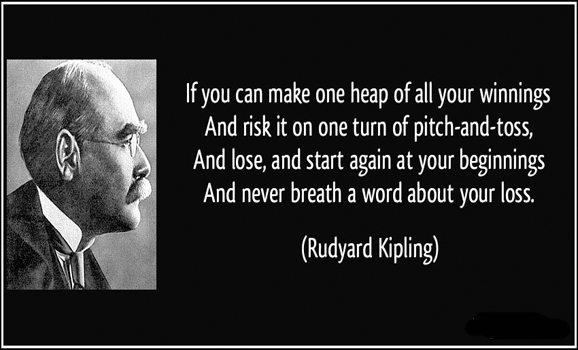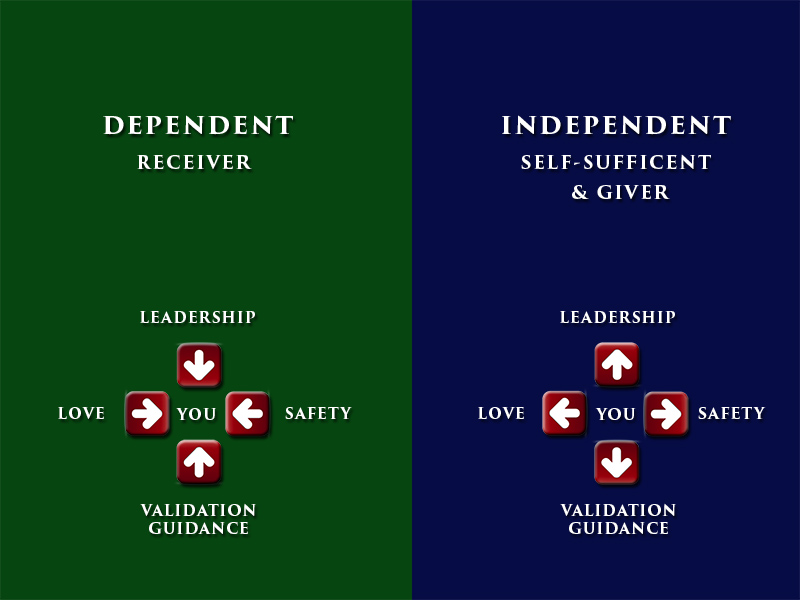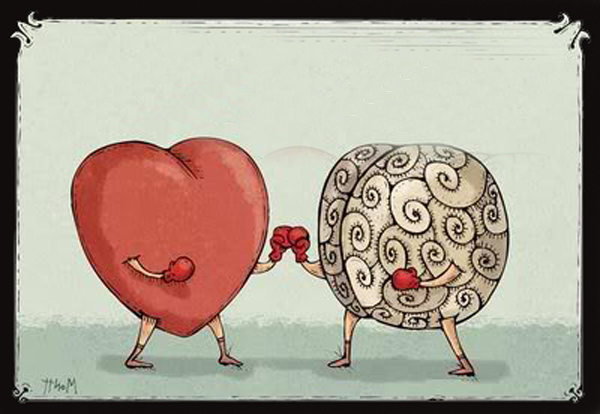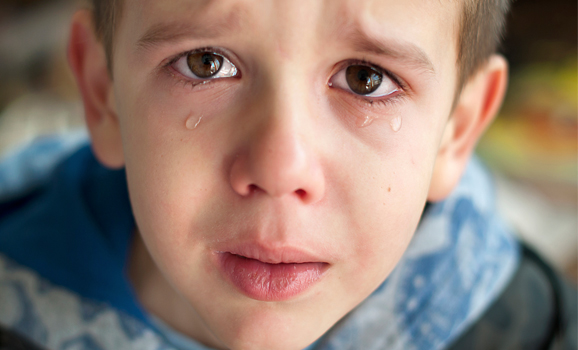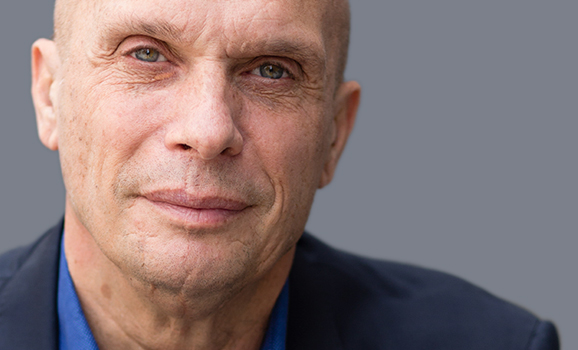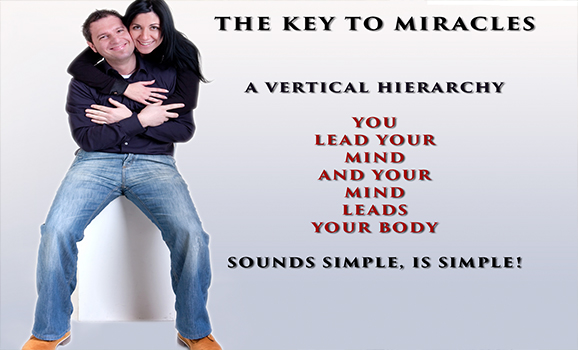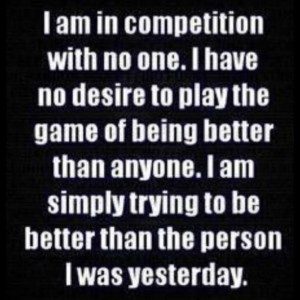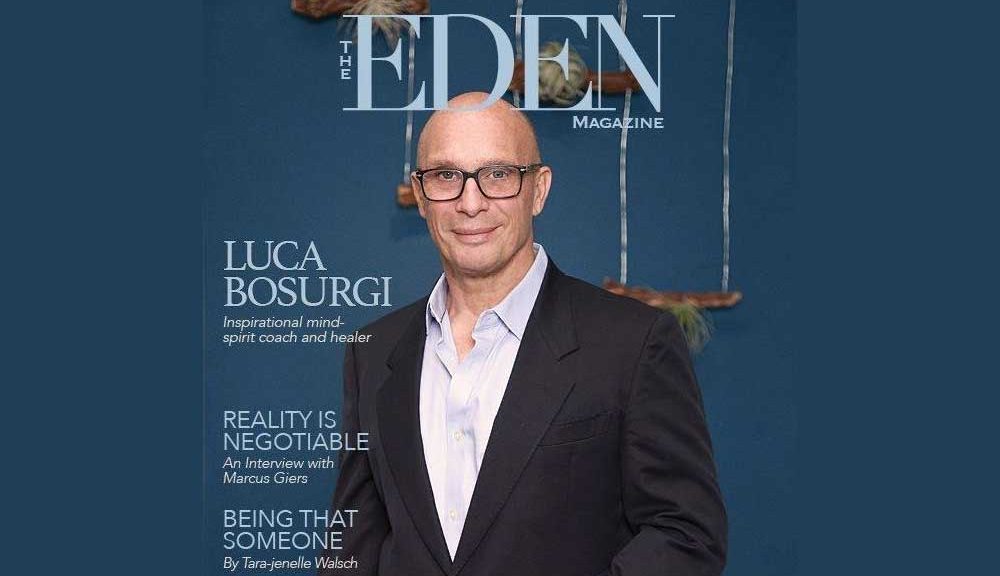
The Eden Magazine September 2017 issue Proudly presenting Luca Bosurgi an Inspirational mind-spirit coach and healer

The Eden Magazine September 2017 issue

Inspirational mind-spirit coach and healer, author and visionary speaker, creator of Mind Fitnes, CognitiveOS Hypnosis and the founder and CEO of the Mind Fitness Lab Corp.

Luca Bosurgi was born in Rome, Italy, to an aristocratic Italian family, the descendants of the Marquis Bosurgi who have a 1,200-year history rich in art, engineering and enterprise. In the early 1890’s, Luca’s grandfather invented concentrated orange juice, and established himself as one of the first Italian Industrialists.
Luca’s history is an eclectic mix of experiences that mesh perfectly with his passion to increase human happiness and self-reliance. At an early age, Luca began receiving extensive spiritual teachings from a channeled holy master. By the time he was becoming an adult, Luca had acquired groundbreaking knowledge about the meaning of life, the spirit-mind hierarchy, the mechanics of the mind and how it relates to mankind’s journey of spiritual evolution.
Luca studied Business & Law at the University Bocconi in Milan. At 23, he was called on to rescue his family company, Sanderson & Sons in Messina, Sicily. In three years, Luca saved 1,500 jobs and secured the continued production of approximately 25,000 citrus farmers. This experience launched Luca into his first career, Investment Banking. At 28, Luca established his investment portfolio in Luxemburg with offices in London and New York. His company focused on Portfolio Management, VC Investments and M&A.
In 2005, after more than two decades of sharing his life between his healing mission and the world of banking, he sold his business and moved to Los Angeles to establish his Mind Fitness™ School and Los Angeles practice. This was the beginning of Luca’s 11-yearlong journey towards perfecting Mind Fitness™, and it has allowed him to enhance and refine his method, improving his success rate from the initial 65% to more than 95% in the last five years. Today, thousands of people have experienced the Mind Fitness™, not only with Luca, but also with the approximately 20 Mind Healers that he has trained.
In 2014, Luca identified Virtual Reality as an effective channel to bring Mind Fitness™ to the public. This motivated him to build a team, and based on the Mind Fitness™ method, develop a Virtual Reality Mind Training solution. The efficacy of using VR as a delivery mechanism for the Mind Fitness™ was tested and proven out in beta testing, showing results that equaled those he obtained in his practice – exceeding 95%.
Additionally, Luca is a Medicine Man (Shaman) empowered with the gift of vision, known by his Native American spiritual name Red Cougar Mountain Spirit. He is also highly trained in ancient combat and martial arts (black belt in judo and karate), and initiated in Western and Easter mind-body disciplines.
Luca consistently seeks effective ways to impart greater balance and healing to those in need. He discovered the power of Clinical Hypnosis in the early 1990’s in London.
He was individually trained by Michael Joseph, Founder and President of the British Society of Clinical Hypnosis and publisher of the European Journal of Clinical Hypnosis. Clinical Hypnosis combined with his comprehensive knowledge of computer and digital science, metaphysics, psychology and ancient mind/spirit healing techniques, became the foundation of Luca’s new form of psychotherapy and mind training, Mind Fitness™. Luca lives with his wife and three children in Santa Monica, California.

Tell us about Luca Bosurgi?
Hmmm, where do I start? I’m Italian. I was born in Rome from an old Sicilian family. I lived an extraordinary life, jam-packed with the most complex and challenging experiences from which I’m so deeply grateful. I traveled the world, lived in many towns, met thousands of amazing people from different cultures, social status and beliefs, and learned from each one of them about life and human behavior. I received vast spiritual training by a holy master, and great initiations by wonder- ful teachers. I’ve been an Investment Banker for over 25 years, and for the last decade I have been, and continue to be, a spiritual and mind fitness coach. My life has been a blessed journey of discovery and understanding of spirituality, integrated with the human nature and behaviors. I’m now based in Santa Monica California, where I see my clients, bring forward my mission, and enjoy my 3 young kids, who are the best teachers I ever had.
Tell us about your mission.
I’ve been passionate about the mind and human behaviors from childhood. I always loved observing people, imagining their thoughts and predicting their reactions; it was a fun game and I loved the challenge. Soon it became more than a game. I spent hours analyzing and comparing my own behaviors with the ones of others, trying to link the purpose of life with our desires and needs. A lot of it made sense to me, but something was off. I trusted natures work to be perfect, our bod- ies to be naturally healthy and balanced as well as our minds. But, most of my friends, and a lot of the world around me, were overwhelmed by emotions, battling anxiety, fear and stress, or addiction and depression, and this was dramatically reducing their performance and happiness. This was odd, and against the law of nature. Emotions are meant to be at our service, not our enemies. So, I embraced the challenge to identify the cause of this widespread emotional disease, and possibly engineer solutions to clear this off so that people can live an easier, more effective, and happier life.
In the middle of my thirties, after I had been rack-ing my brain for years, I finally discovered the cause of these issues, a condition that I named Adult Emotional Dependency (AED). This is a mental disorder that compels emotional dependency from the people around us, causing a variety of emotional distress. In fact, the true hidden cause of most anxiety and fear is choking our society. Its consequences are so severe that the annual cost of stress and anxiety in the US alone is estimated to be $300BN in healthcare and lost productivity. I guess it remained undetected until today because it’s like the elephant in the room, such a common condition that its symptoms are considered the ‘normal’ consequences of modern society and are treated with drugs and symptom specific therapies, instead of hitting the root-cause.
This discovery changed my life. I couldn’t stop thinking about it. The awareness that I had a rather easy solution to resolve and prevent such a globally devastating condition took over my life and became my mission. After a few years of dividing my time between my financial business and AED, I sold my company and came to California to dedicate all of my time to developing and testing a program able to clear the condition and related consequences.
I achieved what I set out to do and as a result, the solution that I identified has already proven successful with over 3,000 clients. The next step is to broadcast this awareness to the world and help people to create all sorts of educational and therapeutically approaches to eradicate Adult Emotional Dependency from our world. This will bring the world to the next evolutional stage where survival is used only in real threatening situations, where drugs and alcohol are used only for recreational purposes, where people can use all their undistracted brainpower to create, succeed, love, and where we can all join our resources to clean and rebuild our world to be decent and kind.
Can you define Adult Emotional Dependency and Self-Reparenting?
In brief, AED is the consequence of a missing emotional development in young adults, where we are meant to self-reparent our bodies and minds into becoming emotionally self-reliant. The lack of self-reparenting shifts our emotional needs from our parents to the world around us, with consequences such as fear of judgment, fear of rejection, fear of abandonment, anxiety, stress, addiction, depression, sadness, poor performances, people ‘pleaser’, procrastination, self-doubt, neediness, social anxiety, poor confidence, lacking an identity, loneliness, angerand so many more…
Self-reparenting is the act of self-adoption, where we assume a maternal and paternal role over our mind and body, becoming the sole indispensable provider of our own emotional needs. This transforms dependency to interdependency, needs to choices, and removes all the mental loops and distress related with the need for others as our essential emotional suppliers. You can read more about self-reparenting and AED at www.selfreparenting. org

Do you mean, to take care of our wounded child within?
No! Proudly reparenting our body and mind as our own son or daughter of our actual age. We don’t have in us a wounded child, we own a superb life equipment (our mind and body) that requires our leadership and emotional supply.
Let me expand on the theory of self-reparenting. Our life on Earth is a journey of learning and understanding, often defined as spiritual evolution. To enable us to live on this planet, we receive equipment (our mind and body) purposely built to give us a physical existence and to harvest awareness through experiences.
This equipment is built like a highly sophisticated biological robot, with eyes as cameras, ears as microphones, mouth as speaker, hands as tools, legs as transport system. Our brain acts as the board computer managed by our mind, the software that operates the entire system.
Our equipment has physical and emotional vital needs, these are meant to be satisfied by our parents during childhood. Around puberty we are meant to take charge of these needs, self-reparenting our body and mind. The level of success we achieve in our self-reparenting process is determined by the life-models we learned from our parents.
Though this is Nature’s plan, it frequently fails because our parents and/or guardians have not achieved emotional independence themselves, so they cannot model and teach these essential life skills to their children. Without good parental models of self-leadership and self-reliance we become either unaware or unable to make the vital self-reparenting step. This obliges our starving mind to shift the seeking of our emotional needs from our parents to the people around us. But people are not surrogating parents, bound by parental love, thus are usually unwilling and unable to satisfy our emotional needs. This is felt as rejection and lack of support triggering all the harsh emotional responses presently choking our society.
What is Mind Fitness?
Mind Fitness is the therapeutic program that I engineered with over 25 years of research and that I use with my clients to help them to implement and enhance their natural self-reparenting process and to remove past traumas.
The basic program spans on 12 sessions of spiritual teaching, life coaching & CognitiveOS Hypnosis®. Spiritual teaching helps implement self-reparenting, enhances self- love and self-leadership–this sets the natural spirit-mind’s alignment and instinctively promotes healthier choices. Life coaching helps to embrace more efficient and healthier behaviors – this fast-tracks the path to emotional freedom. CognitiveOS Hypnosis® helps integrate organically these new tools and models in my clients’ daily routine – this boosts their performance and effectiveness in just a few weeks. Each session is 60 minutes long and combines 30 minutes’ of spiritual-mind-life coaching with 30 minutes of CognitiveOS Hypnosis®, the results are fast and life-changing. It’s a flexible method that I offer in person or remotely via phone or Facetime. I embrace each healing journey with a deep sense of respect, love and responsibility, therefore I only admit clients that I strongly believe will gain results exceeding their expectations. My best candidates are highly smart people, technical enough, however, open to spirituality and ready to embrace their own emotional needs.
In your practice you use Hypnosis, how can this help people?
Hypnosis helps people to enter into the same deep state of meditation used by Buddhist monks in their practice. It can be used for a variety of purposes. I use hypnosis to reduce our natural doubts barrier to the new or unproven. This allows the mind to listen and eventually implement new behavioral models. My proprietary form of hypnosis keeps my clients relaxed and aware of their surroundings, while remaining under their own control and able to regain normal consciousness at any time.
What does CognitiveOS mean?
CognitiveOS Hypnosis is my proprietary language under hypnosis that I refined with over 30,000 sessions. It’s a communication protocol that the mind understands and responds positively. I believe that our mind is perfect and always strives to provide the best possible service trying to keep us safe and operate efficiently. Therefore, if we establish proper communication with the mind, offering safer and more efficient behavioral models, the mind will evaluate them and it will agree on their value, and will implement them in a very short time.

Who can benefit from Mind Fitness?
We can all benefit from a good physical or mental workout, however the areas where Mind Fitness has demonstrated life changing results are with people suffering from anxiety, stress, PTSD, fear, alcoholism or depression, or with the ones that want to improve confidence, gain high-performance, better their relationships and their quality of life. Gaining control over our mind, allows us to gain control over our life, and this improves every aspect of our existence.
What inspired you to write your book “The Mind Shaman?”
I wrote The Mind Shaman as my first intent to bring awareness about self-reparenting to the world. It was written about 4 years ago. The terminology has changed and I progressed extensively in my research and thera- py from then, but the basic concept of self-reparenting and the vital value that is represented and depicted in the novel are all taken from a variety of real-life stories. Most of the stories described in the book are real events, experienced by me or my clients, of course the names and locations are different, but the full content of the book refers to the dramatic transformations that I saw happen in me and my clients when we embraced self- reparenting.
Do you practice Shaman sessions?
I was reconnected with my past-life’s shamanic powers about 9 years ago by a powerful Apache Medicine Woman. I don’t do ceremonies, but every day in my practice, I connect the world of spirits with the world of matter, helping my clients to embrace the two realities and fuse them in one. In each session, I guide my clients in the Sacred Healing Space of the Montaigne, where magic happens, and then inside their own beautiful mind, where more magic occurs.
How do you plan to expand your practice in the future?
In fact, I’m planning to reduce my practice to just a few clients and dedicate most of my time to educate our communities about self-reparenting and engineer tools like the Virtual Reality app that can help people worldwide.
How is your healing method different than other methods?
I guess the main difference is that most healing methods are symptom or behavior driven. Meaning that they focus on alleviating symptoms, or substituting behaviors. My method instead aims to restructure the needs and the priorities of the mind. This consequently removes the negative symptoms and promotes healthier behavioral choice, a much faster and long-lasting solution.
How is the “Virtual Reality Method” different from your one-on-one process?
The ‘Mind Fitness & Detox’ Virtual Reality app is a home Mind Fitness that replicates my program. It implements rather successfully the basics of my program promoting self-reparenting. Of course, it’s not tailor-made for specific client’s needs but does the job. `
How do you feel about using Prescription Drugs when a person has depression? Is it helpful?
Sure, if you don’t have alternatives, drugs will help you to cope. But depression is typically not an organic illness, it’s an overload brain because of excess of anxiety and fear. These burn available brainpower into reducing every other brains activities to a crippling stage. To end depression, we just need to end the causes of anxiety and fear. I saw dozens of clients that had suffered years of depression and end depression in just a couple of weeks. The main problem with drugs, apart from the side effects, is that they are only targeting the symptoms and altering the chemical of the brain, when the root problem is in the mind.
Photography by: Brenda Saint Hilaire Photography
Suit by: Valentino
Location: Mind Fitness, Santa Monica, CA
THEEDENMAGAZINE.COM September 2017
To purchase this publication please visit
http://www.magcloud.com/browse/issue/1343112
To view this publication FREE
https://issuu.com/maryam…/…/the_eden_magazine_september_201


